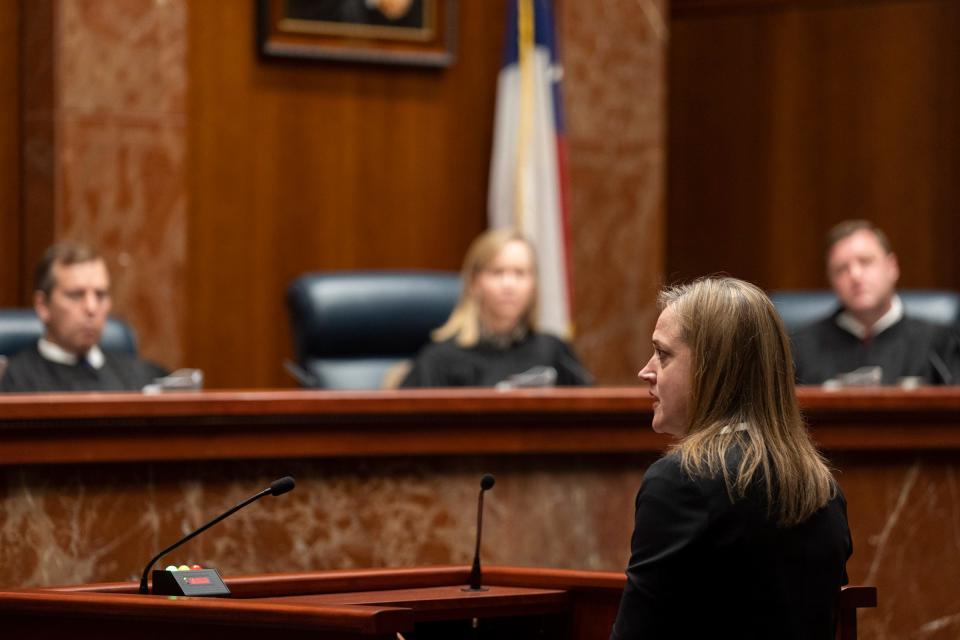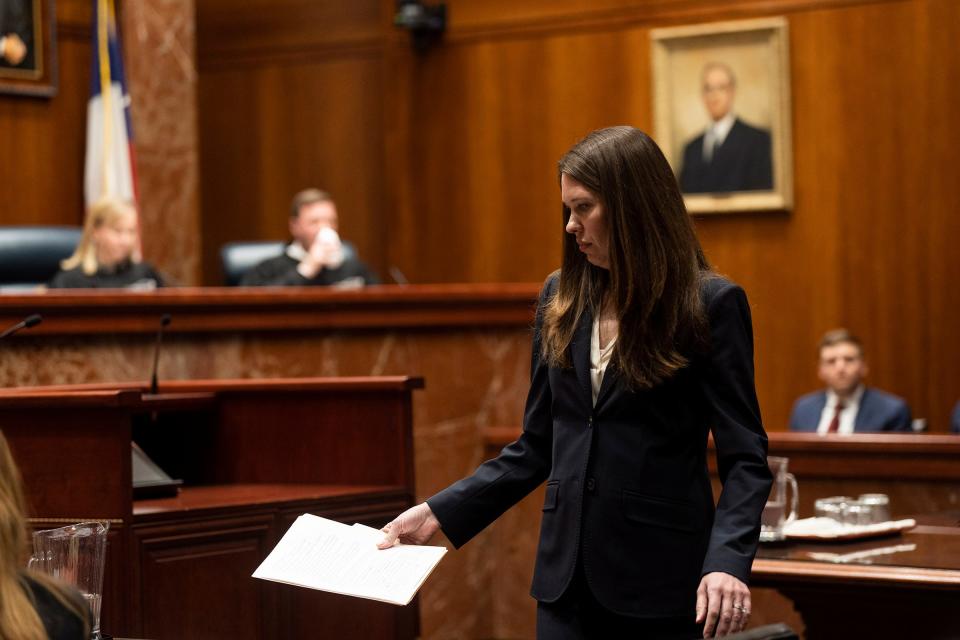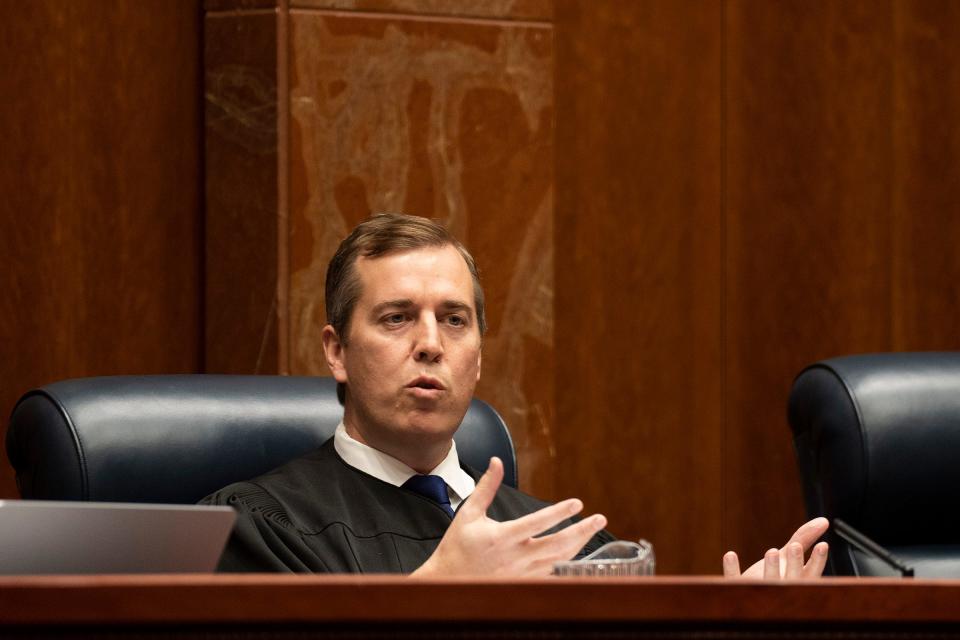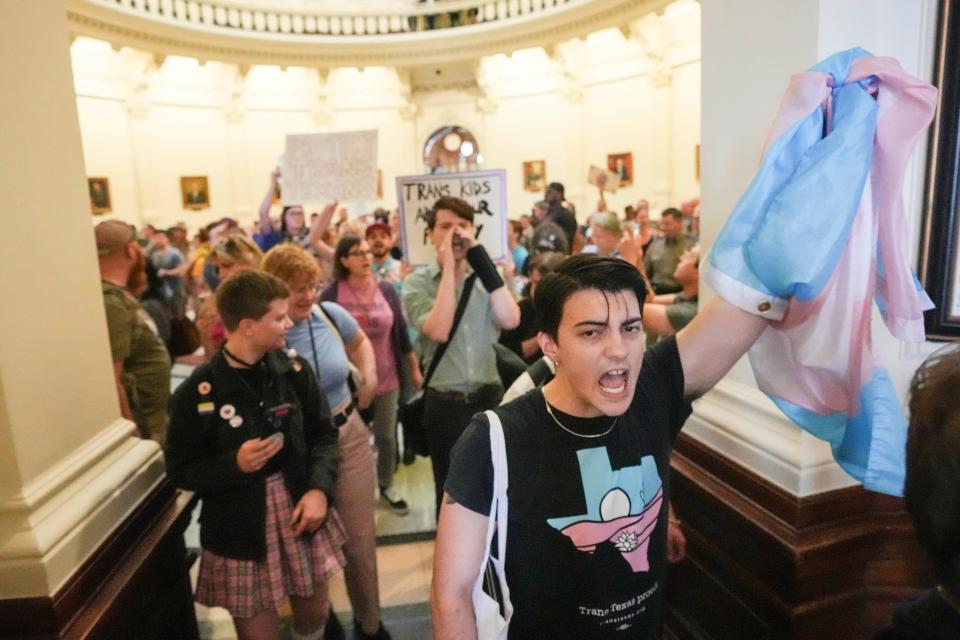Is Texas' ban on gender-affirming care for minors constitutional? Supreme Court hears case
The Texas Supreme Court on Tuesday heard oral arguments on whether parents in the state have the right to let their children receive gender-affirming medical care after the Legislature last year passed a law banning certain treatments.
Senate Bill 14, a priority in the Republican-led Legislature, prohibits doctors in Texas from providing certain gender-affirming medical treatments — including puberty blockers, hormone therapy and certain surgeries — to minors experiencing gender dysphoria, a condition in which a person’s gender identity doesn’t match their sex at birth.
Several families and medical professionals in July filed a challenge to the law in Travis County state District Court seeking an injunction, which the court granted before a state appeal to the Supreme Court allowed the ban to take effect as the high court deliberates the law's constitutionality.

Calling it a violation of the equal protection rights of transgender people, a threat to medical professionals and their ability to practice medicine, and a degradation of a parent's ability to direct their child's medical care, Kennon Wooten, who is representing the families filing the suit, made the argument against SB 14 before an inquisitive panel of justices Tuesday.
"What we do is we risk death by 1,000 cuts of the fundamental rights under the Constitution that parents have to make decisions about the care for their children," Wooten told the court during a 20-minute oral argument.
Dig deeper: Austin parents move to Seattle to give transgender daughter a better life
SB 14 puts transgender adolescents in the position to "face the whiplash of losing their necessary medical treatment and experiencing unwanted and unbearable changes to their body as a result," Wooten argued, echoing similar remarks in previous court filings.
Under the new law, the state's Health and Safety Code has been updated to codify the prohibition on medical professionals from "knowingly performing certain procedures or administering certain treatments [f]or the purpose of transitioning a child’s biological sex."
Wooten said that lawmakers implementing the ban based on the reason for receiving treatment is discriminatory and violates transgender people's rights.
"This is not a situation where the Legislature has drawn lines based on risk; it's simply drawing lines based on the purpose for which you're receiving the care, saying the care is not available to individuals who are transgender," Wooten said.
Natalie Thompson, a lawyer with the attorney general's office who is representing the state and its agencies named in the lawsuit, disagreed with the characterization of SB 14, and she largely downplayed concerns about discontinuing gender-affirming treatments and on restricting parents' ability to decide their children's health care.
"The statute is narrowly tailored to protecting children from interventions that interfere with their growth and development and have irreversible physical effects all without proven mental health benefit," Thompson said.
More: Austin parents move to Seattle to give transgender daughter a better life

Thompson, who asked the Supreme Court to keep the case under its jurisdiction and issue a final ruling on the law's constitutionality, pushed against parents' authority to allow medical interventions targeted by SB 14, saying it doesn't eliminate all health care choices.
"Parents are still the ones who choose between available medical intervention or decline available medical intervention," Thompson said. "What Senate Bill 14 does is take certain medical treatments off the table entirely; that's not interfering with a parent's right."'
Nearly all the justices who were present Tuesday asked questions of both sides as they laid out their arguments, walking through a number of hypothetical scenarios and precipitating factors that could be affected by a future ruling.
Justice Jimmy Blacklock said he feels the court is being asked to consider a question that transcends a simple fact-finding mission, as the issue is one of a "philosophical" nature.

"These are questions of philosophy, morality, maybe even religion; these are not true questions of science," Blacklock said. "And it seems to me that the resolution of this issue flows from what side of that philosophical debate you take, and it's hard for me to see how the court could ever be the appropriate arbiter of what moral and philosophical basis are we going to sort of embed into our laws' approach to this issue."
Chief Justice Nathan Hecht, upon concluding the proceeding, did not indicate when the court will again take up the case or if the proceeding will be adjudicated in the Supreme Court or be returned to District Court for a trial.
In addition to the state eliminating certain gender-affirming care for minors, Attorney General Ken Paxton has demanded that out-of-state hospitals provide him with the medical records of Texas residents who might have received such care at their facilities beginning in 2022.
In his effort, which includes Seattle and Georgia, Paxton cites a Texas provision that forbids companies from making "misrepresentations regarding Gender Transitioning Treatments and Procedures and Texas law."

In December, Seattle Children's Hospital sued the attorney general's office over Paxton's requests, saying Texas officials don't have jurisdiction to require records on procedures and consultations conducted outside the state. QueerMed, a Georgia telehealth clinic, also received a civil investigative demand Nov. 17, the clinic's founder, Dr. Izzy Lowell, confirmed to the American-Statesman. The demand was first reported by the Houston Chronicle.
Paxton is allowed to intervene in situations where there is "reason to believe that a person is committing, has committed, or is about to commit a violation" under the provisions of SB 14, although none of those provisions are valid outside of Texas' borders.
In legal filings, Seattle Children's wrote that the demands "represent an unconstitutional attempt to investigate and chill potential interstate commerce and travel for Texas residents seeking care in another state."
Statesman reporter Bayliss Wagner contributed to this report.
This article originally appeared on Austin American-Statesman: Texas Supreme Court takes up gender-affirming care ban challenge

